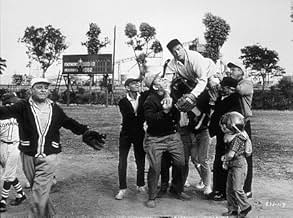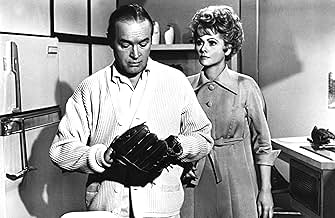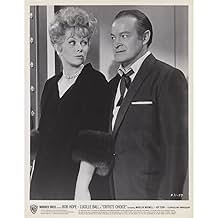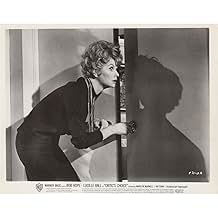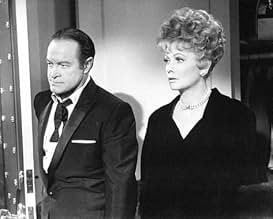CALIFICACIÓN DE IMDb
5.7/10
1.2 k
TU CALIFICACIÓN
Parker Ballantine es crítico teatral de Nueva York y su esposa escribe una obra que puede o no ser muy buena. Ahora Parker debe dejar de criticar la obra o provocar la ruptura de su matrimon... Leer todoParker Ballantine es crítico teatral de Nueva York y su esposa escribe una obra que puede o no ser muy buena. Ahora Parker debe dejar de criticar la obra o provocar la ruptura de su matrimonio.Parker Ballantine es crítico teatral de Nueva York y su esposa escribe una obra que puede o no ser muy buena. Ahora Parker debe dejar de criticar la obra o provocar la ruptura de su matrimonio.
- Dirección
- Guionistas
- Elenco
Rickey Kelman
- John Ballantine
- (as Ricky Kelman)
Joseph Gallison
- Philip 'Phil' Yardley
- (as Evan McCord)
- Dirección
- Guionistas
- Todo el elenco y el equipo
- Producción, taquilla y más en IMDbPro
Opiniones destacadas
New York theater critic Parker Ballantine (Bob Hope) is married to wannabe playwright Angela (Lucille Ball). They live with his son John from his previous marriage to flighty actress Ivy London (Marilyn Maxwell). Angie is writing a play about her family and he's rather dismissive. According to him, she doesn't finish anything. She actually finishes and Dion Kapakos (Rip Torn) is directing it.
It's interesting that his second wife is more age appropriate than the first wife. I would expect it to be the opposite. A switch would make them fit the stereotypes, but it would also deprive the movie of the Hope Ball pairing. I'll take the pairing over the stereotyping. Their stardoms have faded from their pinnacles, but they still have plenty of star power. As a comedy, this is lacking especially considering the two legends involved. It's more a drama than a comedy. At least, it's better as a drama than a comedy. Bob Hope does his comedic mugging and it's not that funny. There is potential with the marital conflict. It works, but I would like more from Ball. This is very much his movie instead of their movie. This was sold as a comedy. It tries to be a comedy. They should have concentrated more on the drama.
It's interesting that his second wife is more age appropriate than the first wife. I would expect it to be the opposite. A switch would make them fit the stereotypes, but it would also deprive the movie of the Hope Ball pairing. I'll take the pairing over the stereotyping. Their stardoms have faded from their pinnacles, but they still have plenty of star power. As a comedy, this is lacking especially considering the two legends involved. It's more a drama than a comedy. At least, it's better as a drama than a comedy. Bob Hope does his comedic mugging and it's not that funny. There is potential with the marital conflict. It works, but I would like more from Ball. This is very much his movie instead of their movie. This was sold as a comedy. It tries to be a comedy. They should have concentrated more on the drama.
When you watch a film that starred two legends of comedy (Lucille Ball and Bob Hope) you expect to find a very funny movie. And, yes, "Critic's Choice" has some amusing parts to it. As a comedy, it's more "Bob Hope" style than "Lucille Ball" style. The humour is more subtle and ironic (more like Hope) than the kind of slapstick physical comedy that Ball was known for - although it does include some physical comedy, surprisingly given to Hope in the last half hour or so. But to call this movie a "comedy" I think is to miss the point. I saw it as more of a drama, even more a psychological study of Hope's character. He played Parker Ballantine, a fierce Broadway critic for a New York newspaper, while Ball plays his wife Angie, who gets it into her head to write a play about her early life with her mother and three sisters.
If I were to rate this as a comedy, I'd probably say that it fell flat - but I was actually quite taken with the story and the character of Parker. He was an unpleasant character. Yes, Hope played him with some comedy - but he wasn't a nice man. Once Angie decided to write her play (very early in the movie) Parker wouldn't let his critic's voice go. He discouraged her, he belittled her, he made fun of her - and most of it, while couched as a comedy, was actually rather mean and not funny. When the movie opened, Parker was writing a scathing review of a play that starred his ex-wife (who was played by Marilyn Maxwell.) That goes almost immediately into his acerbic attitude toward Angie's play. The point gets made in the movie that maybe Parker has a problem - he disses everything that the women who are close to him try to do, almost as if he's trying to sabotage them and their careers; as if he doesn't want a "successful" woman in his life. And, although there's an attempt to redeem him slightly at the end, Parker's most obnoxious scenes come late in the movie at the theatre, the night Angie's play opens in New York. Having withdrawn from reviewing the play, he shows up anyway - drunk and, frankly, obnoxious (I'm not sure why he wouldn't have been kicked out of the theatre, or even why he was allowed in in the first place) - tries to kick his paper's reviewer out and when he can't do that goes up to the balcony and causes quite a scene (this is where Hope's physical comedy comes in.) He then proceeds to write a review of the play anyway and his review is blistering, as he writes that the play "was written by Angela Ballantine, directed by Dion Kapakos, and produced by mistake." (I must admit that I wondered why his paper would allow a drunken reviewer - even a big name one - to write a review of a play written by his own wife to which someone else had been assigned as the reviewer, but maybe that's thinking too much about this.)
This was not what I was expecting. I was expecting a light comedy - instead I got more of a drama about a couple with some really serious issues in their marriage. And while I wouldn't rate it that highly as a comedy, I thought that if you look at it as a marital drama it's actually pretty good. For me, the most powerful scene in the movie didn't even involve Ball - it was the very dramatic and even acerbic confrontation between Parker and his son John (played by Ricky Kelman) - who seems to have irritated a few reviewers, but who I thought was actually pretty good, playing a kid who had obviously been raised in a somewhat strange environment. The scene was set at home on opening night, before Parker's drinking binge. That confrontation aside, John's relationship with his mother (Maxwell) was especially weird - she seems to have been largely uninterested in him, and he calls her not "Mom" but "Ivy."
There's a decent supporting cast - most of whose names (Rip Torn, Jim Backus, Richard Deacon and even Soupy Sales) add to the expectation that you're going to be watching a funny movie. But I would suggest not watching this to get a good laugh, even if that is your initial expectation. Watch it as more of a character study of Parker. It works much better that way. (7/10)
If I were to rate this as a comedy, I'd probably say that it fell flat - but I was actually quite taken with the story and the character of Parker. He was an unpleasant character. Yes, Hope played him with some comedy - but he wasn't a nice man. Once Angie decided to write her play (very early in the movie) Parker wouldn't let his critic's voice go. He discouraged her, he belittled her, he made fun of her - and most of it, while couched as a comedy, was actually rather mean and not funny. When the movie opened, Parker was writing a scathing review of a play that starred his ex-wife (who was played by Marilyn Maxwell.) That goes almost immediately into his acerbic attitude toward Angie's play. The point gets made in the movie that maybe Parker has a problem - he disses everything that the women who are close to him try to do, almost as if he's trying to sabotage them and their careers; as if he doesn't want a "successful" woman in his life. And, although there's an attempt to redeem him slightly at the end, Parker's most obnoxious scenes come late in the movie at the theatre, the night Angie's play opens in New York. Having withdrawn from reviewing the play, he shows up anyway - drunk and, frankly, obnoxious (I'm not sure why he wouldn't have been kicked out of the theatre, or even why he was allowed in in the first place) - tries to kick his paper's reviewer out and when he can't do that goes up to the balcony and causes quite a scene (this is where Hope's physical comedy comes in.) He then proceeds to write a review of the play anyway and his review is blistering, as he writes that the play "was written by Angela Ballantine, directed by Dion Kapakos, and produced by mistake." (I must admit that I wondered why his paper would allow a drunken reviewer - even a big name one - to write a review of a play written by his own wife to which someone else had been assigned as the reviewer, but maybe that's thinking too much about this.)
This was not what I was expecting. I was expecting a light comedy - instead I got more of a drama about a couple with some really serious issues in their marriage. And while I wouldn't rate it that highly as a comedy, I thought that if you look at it as a marital drama it's actually pretty good. For me, the most powerful scene in the movie didn't even involve Ball - it was the very dramatic and even acerbic confrontation between Parker and his son John (played by Ricky Kelman) - who seems to have irritated a few reviewers, but who I thought was actually pretty good, playing a kid who had obviously been raised in a somewhat strange environment. The scene was set at home on opening night, before Parker's drinking binge. That confrontation aside, John's relationship with his mother (Maxwell) was especially weird - she seems to have been largely uninterested in him, and he calls her not "Mom" but "Ivy."
There's a decent supporting cast - most of whose names (Rip Torn, Jim Backus, Richard Deacon and even Soupy Sales) add to the expectation that you're going to be watching a funny movie. But I would suggest not watching this to get a good laugh, even if that is your initial expectation. Watch it as more of a character study of Parker. It works much better that way. (7/10)
Bland comedy/drama about nasty theater critic Bob Hope, who's only happy when he's trashing the latest Broadway sensation, has to contend with his wife, Lucille Ball, deciding she wants to become a playwright. Will Bob write a nasty review of his wife's play? Will Bob write a gushing review? I'm not sure there's any real suspense what actually happens, but the only reason to watch this film is for Hope and Ball, who are good, but the jokes are sadly not all that funny. It also doesn't help that the film lacks the rapid pace of Hope's better comedies. Overall, "Critic's Choice" features two brilliant comedians in a less than brilliant comedy. FUN FACT: This film was based on a play by Ira Levin, who's best known as the author of "Rosemary's Baby" and "The Stepford Wives."
If you want to see Lucy at her least funny, watch this. She looks like she has a lot of personal strain, or something. Lucy never clicked in the movies for some reason, but on TV she soared. Bob Hope also struggles with the lame screenplay. You'll recognize many of the faces here, like Jim Backus and Rip Torn, among others. Apparently the play that this is based on got good reviews, but this movie version is so bad I'm surprised they didn't stop production and revamp it. On an up note, the movie is an indispensable time capsule. With JFK's assassination and the Beatles, this early 60's world would soon change forever. It's also worth seeing for the tiny Soupy Sales cameo.
This movie has possibly the lowest entertainment value/star power ratio I've ever seen. Bob Hope and Lucille Ball, two of the 20th century's greatest comedy geniuses. Plus the legendary Jim Backus, Rip Torn, and a surprise uncredited cameo from a television comedy icon of the 1950's and 1960's who has a brief part as a hotel clerk. You almost have to give the writing, directing, and production team credit for taking a cast this spectacularly talented, and making them so dull and unfunny.
A major problem is the casting. The lovable Bob Hope as a mean-spirited, psychologically abusive husband? Lucille Ball as a mousy, milquetoast-ish wife who mostly takes the abuse her pathetic husband dishes out? The real life Lucille Ball would have kicked Bob Hope's character to the curb after the first 30 seconds -- and we all would have cheered!
But another major problem is that everyone seems to be sleepwalking through their parts. You would expect Jim Backus and Rip Torn to breathe a little life into their characters, but quite untypically, they seem to be phoning in their lines and waiting for their paychecks. Although I am quite impressed with Rip Torn's ability to do handstands in his younger days.
If you are a fan of any of these stars, they ALL have done better films. I'd suggest checking those out first.
A major problem is the casting. The lovable Bob Hope as a mean-spirited, psychologically abusive husband? Lucille Ball as a mousy, milquetoast-ish wife who mostly takes the abuse her pathetic husband dishes out? The real life Lucille Ball would have kicked Bob Hope's character to the curb after the first 30 seconds -- and we all would have cheered!
But another major problem is that everyone seems to be sleepwalking through their parts. You would expect Jim Backus and Rip Torn to breathe a little life into their characters, but quite untypically, they seem to be phoning in their lines and waiting for their paychecks. Although I am quite impressed with Rip Torn's ability to do handstands in his younger days.
If you are a fan of any of these stars, they ALL have done better films. I'd suggest checking those out first.
¿Sabías que…?
- TriviaLast of four feature films that Bob Hope and Lucille Ball made together. The other three pictures were Los nuevos ricos (1950), Dejada en prenda (1949), and Amor es juego prohibido (1960).
- ErroresThe movie takes place in New York, but during the softball game, the famed Los Angeles Gas Works tank is clearly visible in the background.
- Citas
John Ballantine: For the record, Sisters Three was written by Angela Ballantine, directed by Dion Kapakos, and produced by mistake.
- Créditos curiososEnding: "The absolute End"
- ConexionesReferenced in What's My Line?: Bob Hope and Lucille Ball (1963)
Selecciones populares
Inicia sesión para calificar y agrega a la lista de videos para obtener recomendaciones personalizadas
- How long is Critic's Choice?Con tecnología de Alexa
Detalles
- Fecha de lanzamiento
- País de origen
- Idioma
- También se conoce como
- Critic's Choice
- Locaciones de filmación
- William Mead Homes, 1300 Cardinal Street, Los Ángeles, California, Estados Unidos(Apartments/baseball field)
- Productora
- Ver más créditos de la compañía en IMDbPro
- Tiempo de ejecución1 hora 40 minutos
- Relación de aspecto
- 2.35 : 1
Contribuir a esta página
Sugiere una edición o agrega el contenido que falta

Principales brechas de datos
By what name was Cuando el corazón manda (1963) officially released in India in English?
Responda

